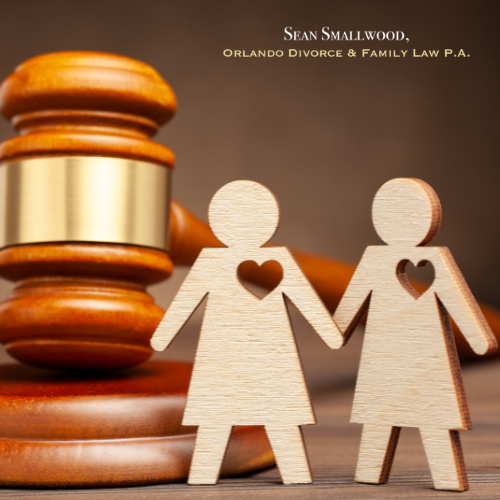BEST Florida Same Sex Divorce Attorney – LGBTQ+ Divorce Attorney Near You
Whenever a marriage has reached the stage to discuss divorce and the logistics of divorce, understanding how the legal system works and how the law will support each party is extremely important. The rules around divorce, custody, alimony, child support, and other aspects of divorce in Florida are nearly the same – regardless of the gender of each of the involved parties. Same-sex couples in Florida have the fundamental right to divorce, just like couples of opposite gender do. Sean Smallwood has experience with all types of divorce in Florida – and is here to help his clients protect their interests during a divorce, from child custody, alimony, child support, and through to property division and the ultimate judgement granting the LGBTQ+ divorce in Florida
 Same-sex Couples in Florida Have The Fundamental Right To Divorce
Same-sex Couples in Florida Have The Fundamental Right To Divorce
Yes, Florida allows same-sex divorce. Since the legalization of same-sex marriage in all 50 states in 2015 in the case of Obergefell v. Hodges, same-sex couples in Florida have the same rights as heterosexual couples, including the right to marry and divorce. There is a gray area here when it comes to the Native American residents of Florida. Federal and state court rulings do not apply to the Seminole Tribe of Florida and the Miccosukee Tribe of Indians of Florida, which have jurisdiction over marriages and divorces performed under tribal law. Ultimately, hiring an experienced LGBTQ+ divorce lawyer near you is imperative to protect your best interests during a difficult season of life.
How Does Same-Sex Divorce Work in Forida?
Same-sex divorce in Florida follows the same legal procedures as heterosexual divorce. This includes filing a petition for dissolution of marriage, serving the other party, and going through the necessary court hearings. There may be unique challenges due to issues like parental rights and custody, especially if one or both partners did not adopt the child.
Unique Challenges of Same–Sex Divorce in Florida
Same-sex divorce can present distinct challenges that often stem from societal biases, legal complexities, and the unique dynamics of same-sex relationships.
Parental Rights After LGBTQ+ Divorce in Florida:
One of the most significant challenges in same-sex divorce is often related to parental rights. If one partner is not the biological parent, they may face difficulties in establishing parental rights, particularly if the child was conceived before the couple was legally married. This can lead to disputes over custody, visitation, and child support.
For example, in a case where a same-sex couple has been together for many years and one partner has been actively involved in raising the child, but is not the biological parent, they may encounter resistance from the biological parent or the court in seeking custody or visitation rights.
Societal Bias After Same Sex Divorce in Florida:
Unfortunately, same-sex couples can still face discrimination or prejudice from the court or other parties involved in the divorce process. This can manifest in various ways, such as biased assumptions, unfair treatment, or a lack of understanding of the unique dynamics of same-sex relationships.
For instance, a same-sex couple might find it more difficult to obtain a fair division of assets or custody arrangements due to negative stereotypes or biases held by the judge or other parties involved in the case.
Complex Property Division – Hire A LGBTQ+ Divorce Attorney Near You in Florida:
Dividing assets and debts can be more complex in same-sex divorces, especially when one partner has a stronger financial standing or when there are commingled assets. This can be particularly challenging if the couple has been together for a long time and has built a joint life together.
For example, if a same-sex couple has purchased a home together, it may be difficult to determine the equitable division of ownership. Additionally, if one partner has a higher-paying job or has inherited wealth, the division of assets may need to be carefully negotiated to ensure a fair outcome. While this can be unique to a same-sex divorce, it is something we see in heterosexual divorce as well.
Brenner v. Scott – Landmark Florida LGBTQ+ Parental Rights Ruling.
In the landmark case of Brenner v. Scott, a Florida court ruled in favor of a non-biological parent in a same-sex divorce, establishing that a significant parental relationship can confer parental rights, even when there is no legal adoption. This decision was a significant victory for LGBTQ+ families, addressing a common challenge faced by non-biological parents who have played a crucial role in raising a child. Prior to this ruling, these parents often struggled to secure parental rights, leaving them vulnerable to losing their connection with the child in the event of a divorce.
The Brenner v. Scott case faced challenges due to the lack of legal precedents for same-sex relationships, societal biases against LGBTQ+ couples, and the complex legal considerations involved in determining parental rights. Despite these obstacles, the court recognized the importance of parental bonds formed outside biological relationships and the best interests of the child. The ruling has had a significant impact on the legal landscape for LGBTQ+ families in Florida and has served as a precedent for similar cases in other jurisdictions, providing greater legal certainty for non-biological parents.
How Does Custody And Child Support Work In Same-Sex Divorce in Florida?
Custody and child support in same-sex divorce are determined based on the best interests of the child. The court will consider factors such as the child’s bond with each parent, and the stability of each parent’s home. In Florida, unlike other states, there is no specific age at which a child can unilaterally decide which parent they want to live with. The court will ultimately decide custody arrangements based on the long-term best interest of the child. However, as children get older and more mature, their preferences may carry more weight with the court. Child support is calculated using the same guidelines as in heterosexual divorces.
When both parties in a same-sex divorce have legal rights to a child, the court must determine which parent should have primary custody. This can be challenging when both parents have strong parental relationships and can provide a stable environment for the child.
Challenges If Only One Person Is The Legal Parent
If only one person in a same-sex divorce is the legal parent, the non-biological parent may face challenges in obtaining custody or visitation rights. They may need to establish a parental relationship through adoption or a paternity action, which is difficult to do while a divorce is in process. Sean is a skilled paternity lawyer in Orlando and can help.
Alimony in Florida Same-Sex/LGBTQ+ Divorces
Alimony, also known as spousal support or maintenance, is typically awarded in same-sex/LGBTQ+ divorces based on the same factors considered in heterosexual divorces. This includes:
- Length of the marriage: Longer marriages may warrant a longer period of alimony.
- Financial need: The court will assess the financial circumstances of both parties, considering factors like income, earning potential, and expenses.
- Standard of living: The court may take into account the standard of living the couple enjoyed during the marriage.
- Fault: While fault is generally not a major factor in determining alimony, it may be considered in some jurisdictions.
Unique Considerations – Why You Need A LGBTQ+ Divorce Attorney in Florida:
- Pre-Marital Cohabitation: If the couple lived together for a significant period before marriage, the court may consider this time when determining the length of the marriage for alimony purposes. This is especially necessary if the relationship was started before it was legal for the couple to marry in Florida.
- Economic Dependence: In some cases, one partner may have sacrificed their career or education to support the other during the relationship. The court may take this into account when determining alimony.
- Legal Challenges: In jurisdictions where same-sex marriage was not recognized until recently, there may be unique legal challenges related to alimony. For example, the court may need to consider the economic impact of a long-term partnership that was not legally recognized as a marriage.
It’s important to note that alimony laws can vary by state, so it’s advisable to consult with a Florida LGBTQ+ family law attorney to understand the specific laws here in the Sunshine State.
Navigating a same-sex divorce in Florida can be complex, especially due to the unique challenges that arise from societal biases, legal complexities, and the specific dynamics of same-sex relationships. While the legal procedures for same-sex divorce largely mirror those of heterosexual divorce, understanding the nuances and potential obstacles is crucial for a successful outcome.
By consulting with a qualified LGBTQ+ family law attorney like Sean Smallwood, individuals can obtain the necessary guidance and representation to protect their rights and interests throughout the divorce process. With expertise in Florida’s laws and a deep understanding of the challenges faced by same-sex couples, Sean can provide invaluable support in navigating issues such as parental rights, property division, custody, and alimony.
Whether you’re seeking legal advice or representation, it’s essential to work with an attorney like Sean, he is knowledgeable about the specific legal landscape for same-sex divorce in Florida. By doing so, you can increase your chances of a positive outcome and minimize the stress associated with this difficult process.

 Same-sex Couples in Florida Have The Fundamental Right To Divorce
Same-sex Couples in Florida Have The Fundamental Right To Divorce
